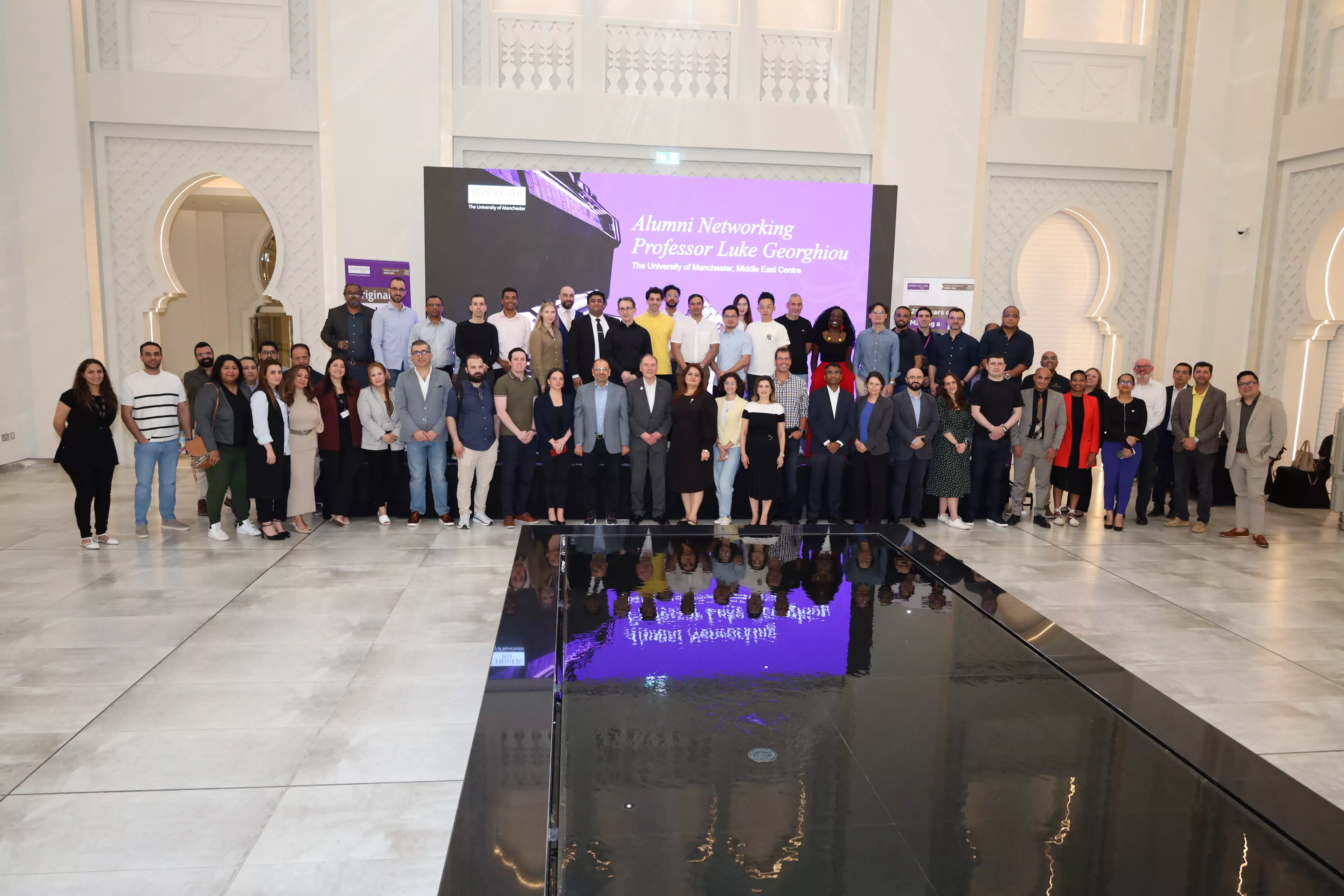
The Middle East Centre was delighted to welcome Professor Luke Georghiou - Deputy President and Deputy Vice Chancellor of the University of Manchester – on his first visit to Dubai, recently. The visit coincided with Global MBA workshops hosted by the Centre and he was able to see academics and students in action, as well as meet Centre staff, student representatives, GEMBA students, Alumni Ambassadors, Teaching Associates and local faculty, during an intensive day’s schedule. During his visit, Professor Georghiou spoke about the University's internationalisation strategy, executive education, bicentenary celebrations and the university's relationships and collaborations in the Middle East, including the potential for research.
In his role, Professor Georghiou provides support for the President and Vice Chancellor (Professor Dame Nancy Rothwell) and also has direct responsibility for innovation and internationalisation – including the international centres. Dubai was his first stop on a visit to the University's network, which also took him to the Centres in Singapore and Hong Kong. On his first impressions of Dubai, he said: “I have been to Dubai airport many times but coming outside, it's obviously a very impressive place architecturally. It's incredible and so very dynamic.”
Through his discussions, Professor Georghiou emphasised the potential to do more through the Centres: “The Centres are doing a great job and they have potential to do more and we're looking for ways in which further aspects of the University can connect to them. I've had a detailed presentation both of the history of the Middle East Centre - our first such Centre - and the achievements along the way. The Centre continues to perform very well and social responsibility is taken very seriously here with a lot of achievement to back this up. The focus is very much on high level business education, and now with an extension into educational leadership, and the general feeling is that there's a lot more that the University could do with this kind of approach - particularly in the other faculties. So, we want to explore this potential. “
There is a general trend towards flexible learning. The pandemic gave us a taste for it but it was a rather crude taste. Almost every university in the world had to pivot to online learning in a week and this is not the quality of offering we would want but I think it was a great learning experience for us. We think we can now provide the kind of offering the Centres deliver, which is much more than online but still retains this along with an interactive element across other subjects - I won't say a full range of subjects because you can't do all training in this way. There are very many things you can do in the educational dimension but I think there's even more. The Middle East Centre particularly already has excellent relationships with a number of corporates and we believe that we can project our business engagement more widely - and indeed the other way round by bringing some of our global relationships to the centres. We have a new leader in Executive Education and I think there's plenty of opportunity there, as well.”
Professor Georghiou was very interested to meet regional alumni: “In a sense they are the most important people for the University since they represent those that we've tried to help along the way. So, it's always stimulating to hear how well alumni have done and not only get their feedback on their days as students but to understand their careers and ways in which we can work with them in the future as well. As a context, we have more connected alumni than any other UK university and it's a community of over half a million now. I'm very grateful that our alumni are so connected and supportive of the University.”
Another of Professor Georghiou’s roles is chairing the University’s Graphene Strategy Board and, in that context, he has had a lot of interaction particularly with Abu Dhabi and Masdar and is very used to working with the Emirates. “
Our partners from Abu Dhabi have always been a very helpful influence on the board of our Graphene activities but there are two new things which have come into play in the last three or four years. First of all, a partnership with Khalifa University. There are some very good projects and important people on exchange visits and I think there's more to come from that. The other development has been on the entrepreneurship side. We've had quite a booming set of start-ups and spin-outs both from staff and students in the Graphene field and some of them have been attracted to this region and have formed very valuable business partnerships and even been adapting their technologies to work in these particular conditions. For example, Vivek Koncherry (CEO of Graphene Innovations Manchester) goes from strength to strength and I've been particularly happy to see that because I gave Vivek his first prize for innovation and he's gone on from there.”
This year, Professor Georghiou also leads on the bicentenary celebrations, which involves coordinating events globally, with key upcoming events such as the Universally Manchester Festival and the Times Higher Education World Academic Summit. “I think I probably got this role because I've been in the University longer than most people. I was a student in Manchester as well so I've actually been in the university for just over a quarter of its 200 years. I arrived in 1973 and first did an undergraduate degree and then a PhD and then got a job in the University and have been there ever since.”
Professor Georghiou’s parting message was to express the University’s deep thanks to the Middle East Centre staff for all the great work that they're doing, and appreciation for the students who put their trust in the University - “I think they demonstrate to us that they've made the right decision by having such brilliant careers afterwards.”
